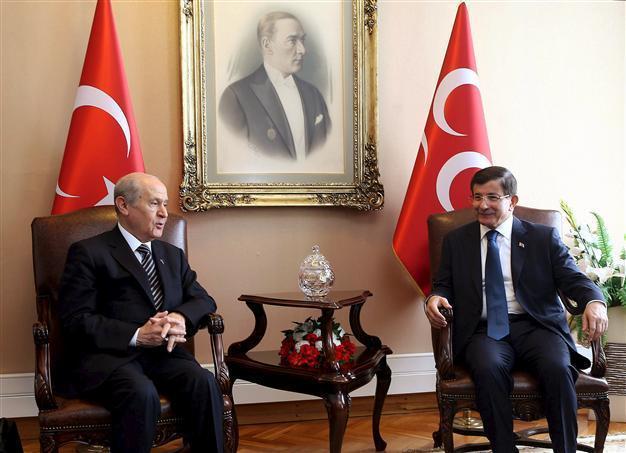Failure of AKP-MHP talks herald early polls in Turkey
ANKARA

REUTERS photo
A last-ditch effort by Turkey’s incumbent prime minister, Ahmet Davutoğlu, to form a coalition failed on Aug. 17 as a meeting with the country’s main nationalist party ended with no agreement, paving the way for new elections.“Mr. Bahçeli said he doesn’t consider a coalition with the AKP [Justice and Development Party] possible,” Davutoğlu told reporters at a press conference following his meeting with Nationalist Movement Party (MHP) leader Devlet Bahçeli.
Bahçeli was the one who first put forth his position on the matter during their meeting, Davutoğlu said, adding that the MHP leader repeated his strict conditions for the formation of a coalition.
Bahçeli not only shut down the prospects for a coalition partnership, but also refused to be part of a short-lived alliance to govern until early elections and support a minority government that would be held by the AKP, Davutoğlu said.
“He said they would be present in parliament in the event of a vote on an early election but would not support such a decision,” Davutoğlu said after the meeting which took place days before a 45-day deadline to establish a new government runs out on Aug. 23.
Labor and Social Security Minister Faruk Çelik accompanied the AKP leader, while MHP Deputy Chair Semih Yalçın accompanied Bahçeli during the meeting. Following their gathering at Bahçeli’s office in parliament, both leaders reviewed the meeting with the executives of their parties.
Overlapping grassroots
The prospects for a partnership between Davutoğlu’s AKP and the MHP, the grassroots of which partially overlap in terms of their right-wing nationalism, already looked slim due to separate statements made earlier by the two leaders. Soon after the hopes for a grand coalition with the Republican People’s Party (CHP) were dashed on Aug. 13, Davutoğlu stated that new elections appeared to be Turkey’s “only option.”
For his part, Bahçeli constantly repeated his desire for a constructive effort to prevent the country from being left without a government, but only on certain conditions that would be difficult to fulfill for the AKP:
Suspending the peace process with the outlawed Kurdistan Workers’ Party (PKK) to end the three-decade conflict between Turkey’s security forces and the PKK; sticking to the current constitutional definition of citizenship, which includes the phrase “Turkishness,” in order to “end ethnic and sectarian-based polarization;” and an “effective fight against bribery and corruption,” particularly in regards to the corruption and graft claims revealed on Dec. 17 and 25, 2013, that targeted figures close to the government.
While declaring last week that an early election loomed on the horizon, Davutoğlu also urged parliament to call for a new vote as soon as possible, apparently hoping for an agreement with the MHP that would allow his government to stay in power until the new election takes place.
President Recep Tayyip Erdoğan, the founding leader of the AKP, is also reported to favor new elections in the hopes that the party can win back its parliamentary majority.
But the MHP said it had no interest in propping up an AKP minority administration. Unless the AKP is prepared to accept nationalist conditions for a full coalition, there is little point in even negotiating, said the MHP.
Returning the mandate
Speaking at the Aug. 17 press conference, Davutoğlu responded to the MHP’s conditions, underlining that the president’s authorities were not for discussion by any party and that the AKP’s democratic reforms helped ease many controversies in the country, even as the government was determined to fight terrorism.
Davutoğlu declined to give a clear answer when asked whether he would return the mandate to President Erdoğan.
“I believe that I have tried all possible formulas since July 9,” he said, referring to the date when he was given the mandate, kicking off the 45-day deadline.
“But if there are no grounds, then I have full respect for decision-making processes of party chairs who have been my counterparts. There is no picture requiring a new step. We will consult with our president. I will of course return the mandate if needed,” Davutoğlu added.
The Dec. 17 and 25 files were part of an “coup attempt” by a “parallel structure,” he also said, referring to the followers of U.S.-based Islamic scholar Fethullah Gülen who have been accused of forming a “parallel structure” within the state. The AKP, leader, nonetheless, added that he has favored “transparency.”
The winner of three consecutive parliamentary elections since 2002, the AKP lost its parliamentary majority in the June 7 election. The CHP received the second highest number of votes. While the MHP got the third highest number of votes, it holds an equal number of seats in parliament with the Peoples’ Democratic Party (HDP), which broke the 10 percent electoral threshold, effectively consigning the AKP to a plurality, but not a majority.
















